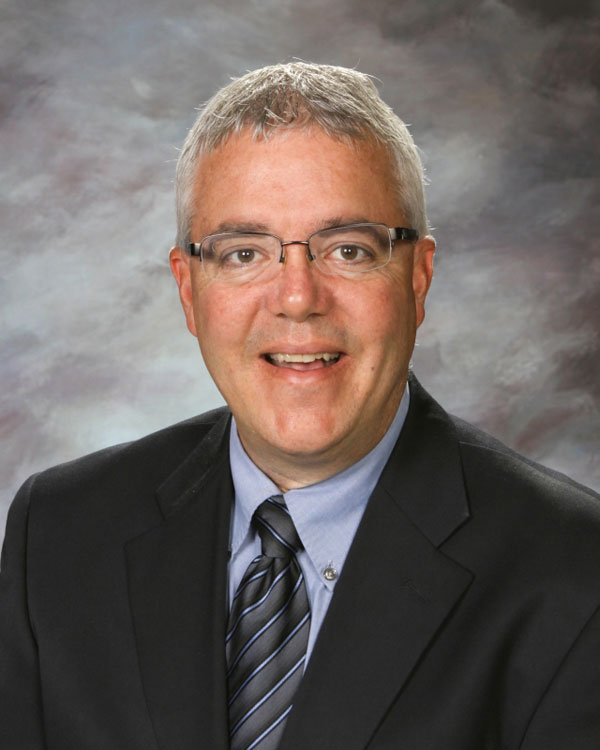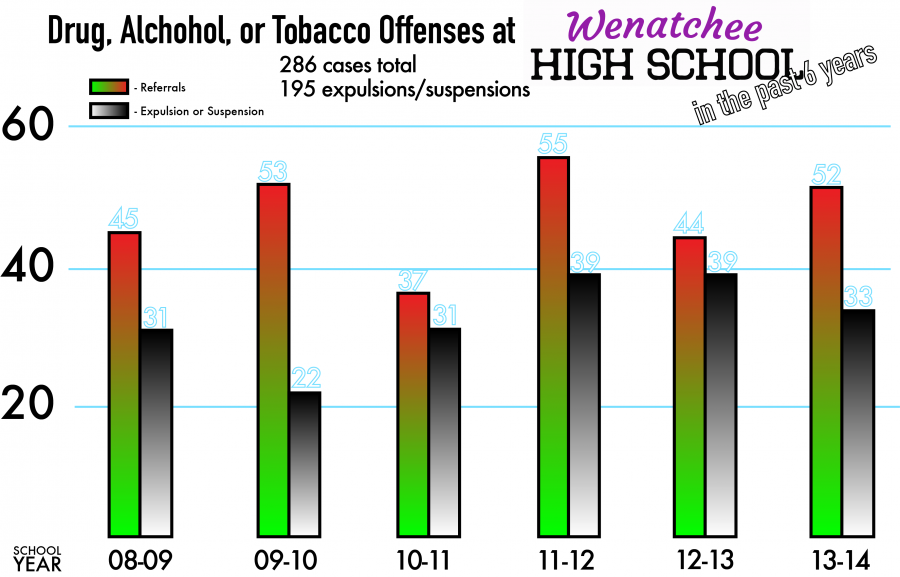Data reveals large discrepancies in discipline for substance-abusers
Survey says WHS alcohol, marijuana use higher than state average
January 9, 2015
Data provided by Wenatchee School District Safety and Security Department and Wenatchee High School discipline report.
Wenatchee School District discipline statistics show some student substance-abusers aren’t being disciplined according to district policy by high school administrators — a common trend for the last six years. And survey results show that drug and alcohol use by WHS students exceeds the state average.
“It’s kind of a mystery to me,” Wenatchee School District Student Assistance Specialist Amy McCubbin said of the discipline statistics.

According to a report obtained by The Apple Leaf from Wenatchee School District’s Safety and Security department, 286 students have been referred to the WHS administration from September 2008 to June 2014 for suspicion of alcohol-, tobacco- or drug-related offenses by the Safety and Security department. Of those cases, only 10 alcohol- and 47 drug-related cases have continued to a criminal case with the Wenatchee Police Department.
Wenatchee School District procedure 2121 states: “Law enforcement agencies will be called upon for investigative and consultative assistance where illegal drug or alcohol activity has occurred.”
WHS Principal Bob Celebrezze said the police will always be called for consultation, but that doesn’t mean they’ll need to be called in to investigate every situation. If a student admits to substance abuse or it’s blatantly evident that they’re under the influence, no call to local law enforcement is necessary. When a student is in possession or involved with purchasing or selling controlled substances at school, the police would automatically be contacted, he said.

District Administrator of Student Services John Waldren said in most cases, law enforcement is contacted as the policy states, but there is some flexibility that just depends on the situation. Waldren said he is more interested in the intervention cycle for students because he wants to see them in school, he said.
Some might look at the large discrepancy in data and conclude that students aren’t being treated equally. Multiple sources told The Apple Leaf that this is true, but were afraid to be named. They cited “circumstances” (specifically athletics) or the “timing [of the alleged violation]” as two reasons students might not be receiving consistent discipline.
So, if students are being disciplined differently, is this a sign that administrators need more training on district policy? Or if students are going to be treated differently to allow for flexibility, is it wise to rewrite district policy?

Assistant Superintendent of Learning and Teaching Jodi Smith, who oversees instruction policies, according to Waldren, hasn’t returned a request for comment since originally contacted Dec. 11. Director of Risk Management and Safety Adam Bergstrom said he had nothing to add to what Waldren said.
The school board approved a risk management plan in December, which promoted Bergstrom to become the director of risk management and safety for the district. The draft proposal for this plan, provided to The Apple Leaf by the Superintendent’s Office, does not include reviewing substance abuse policies or procedures as part of the nearly 100 areas identified for needing initial attention.
According to Wenatchee School District procedure 3241, the use of alcohol, drugs, sale, and/or delivery require emergency expulsions.
Records obtained through a public disclosure request to the Wenatchee School District indicate not all 286 cases reported to high school administrators by safety and security in the last six school years have resulted in suspensions or expulsions — only 195 have.
“It doesn’t make sense to me,” McCubbin said. “Going by policy [for drug, alcohol, and tobacco], there should not be that big of a discrepancy.”
Celebrezze said some reasons for the difference in referral and discipline data could be that the student decided to drop out or transfer schools when found guilty, or because they are not found guilty after an investigation of their referral.
The Range of Sanctions chart, part of district procedure 3241, indicates the minimum corrective action for possession or use of alcohol or any controlled substance is a long-term suspension. This action can last for 11 to 90 days, according to WHS Safety and Security Officer Don Durden. The maximum action is expulsion, which lasts for a year at the least. An expelled student can’t attend a public school in the state for that time period, Durden said.
Ultimately, it’s the administrator’s decision to decide what to do with a student brought to their attention for drug, alcohol, or tobacco violations, McCubbin said. McCubbin noted that it is sometimes “days” before she finds out from administration about students who have violated the drug or alcohol policy.
The “biggest and boldest move” by the Wenatchee School District, Celebrezze said, was deciding to hire a school resource officer back into the district as part of the risk management plan, contracted through the Wenatchee Police Department. He said students might be less inclined to come back from lunches under the influence with a trained police officer on campus watching.
WHS officials often detect student misconduct on the surveillance cameras, Durden said. He described a time that he saw students poking holes in an apple, which he said is a common sign that apple would be used for smoking marijuana.
Durden said school officials have a broader standard than police officers when searching or investigating student misconduct. While law enforcement officers are held to the standard of “probable cause,” he said school officials simply need “reasonable suspicion” in order to pursue a discipline or turn an investigation over to law enforcement. The new school resource officer, who still has to be hired, will operate under law enforcement guidelines, Bergstrom said in an email.
The definition for “reasonable suspicion” has two parts, according to the Association for Supervision and Curriculum Development.
— It’s justified at its inception. There are reasonable grounds for suspecting the search will reveal evidence that the student has violated or is violating the law or school rules.
— The search is reasonably related in scope to the circumstances that justified the search, meaning that the measures used to conduct the search are reasonably related to the objectives of the search.
“It is looser than probable cause,” according to the Cornell University Law School website.
Safety and security officers at WHS have access to an Alco-Sensor Field Sobriety Test breathalyzer, and are also equipped with a drug recognition testing kit. Both officers are trained with both of these tools, and use them in situations where reasonable suspicion is present. Durden said the breathalyzer has been used at school dances in the past. The tests can be refused by students, he said.
ADMINISTRATION RESPONDS TO ALCOHOL REPORT
After The Apple Leaf’s coverage of intoxication at school events, Celebrezze issued a statement to all parents and faculty outlining new guidelines and procedures in place for future school dances.
At the larger-scale dances, like Prom and Homecoming, there will now be two administrators, 10 teacher chaperones, parent chaperones, two on-duty police officers, and WHS safety and security staff present, Celebrezze said in his Dec. 2 letter to all families and faculty.
This is a change, as only one on-duty police officer was present at the 2014 Homecoming dance. New this school year, teachers were compensated for chaperoning the dance. The compensation will continue for future dances, Celebrezze said.
Celebrezze also said in his Dec. 2 letter that students who attend school events under the influence of drugs and alcohol will receive school discipline, after being turned over to local law enforcement. WHS would follow “due process and district procedures” for handling these situations, he said.
In an earlier interview with The Apple Leaf, Celebrezze said three students were arrested at the 2014 Prom, held at the Town Toyota Center, which The Apple Leaf reported in this Nov. 5 article. A check of Wenatchee Police Department and Chelan County Sheriff’s Office records indicated only one arrest was made, of a non-student, for being a minor in possession. The 18-year-old was taken to the Chelan County Regional Justice Center.
Originally, the student was only going to receive an MIP citation, which was requested by Celebrezze, but became “belligerent” with Celebrezze, which is when Celebrezze requested the sheriff arrest him, according to the sheriff’s report. In an interview Dec. 3 with The Apple Leaf, Celebrezze revised his statement, saying there were three students law enforcement were “dealing with” during the event.
“We have no interest in any type of rebuttal to the [Nov. 26] article and are both moving forward,” Celebrezze and Assistant Principal Dave Perkins said in an email to The Apple Leaf. “All members of the Wenatchee High School administration believe and demonstrate through action that students making good choices is paramount to their learning, safety, and well-being.”
SURVEY POINTS TO SUBSTANCE ABUSE PROBLEM AT WHS
According to the 2012 Washington Healthy Youth Survey, WHS sophomores and seniors were higher than the state average by up to five-percent for alcohol use, binge drinking, substance use at school, and marijuana use.
According to Celebrezze, one reason he sees for the higher statistics, compared to the state or metro areas, could be the socioeconomic demographics at WHS.
McCubbin said this is the third school year that the freshman class has received an intervention education “crash course,” called Project Success, initiated by the state Department of Behavioral Health Resources. Since the state marijuana laws have changed, McCubbin said her caseload of student-users has gone up.
The 2014 Healthy Youth Survey was completed last school year, and the results will be available to school district administrators in March. These results will be compared to 2012’s, Durden said.
The Healthy Youth Survey is administered by the Washington Department of Health.


Suellen Harris • Jan 9, 2015 at 6:53 pm
Congratulations to the Apple Leaf on your diligence in investigating safety issues in the district. I do have one question regarding this particular article.
Did Mr. Celebreze elaborate on which socioeconomic demographics at WHS he was referring to? Does the Apple Leaf know which demographics are referenced? (poverty? racial? ethnic? gender? single parent?) “According to Celebrezze, one reason he sees for the higher statistics, compared to the state or metro areas, could be the socioeconomic demographics at WHS.”
Bryce Newberry • Jan 13, 2015 at 7:31 am
It is unclear which socioeconomic demographics are referenced. Principal Celebrezze noted a few of them. Some factors of socioeconomic demographics, according to Dictionary.com, could include occupation, education, income, wealth, race, and place of residence. Thank you for reading The Apple Leaf.